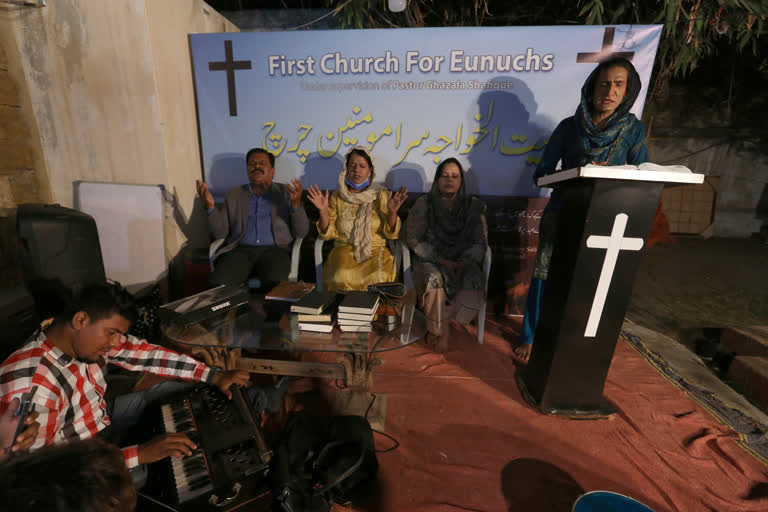Karachi:Pakistan’s Christian transgender people, often mocked, abused and bullied, say they have found peace and solace in a church of their own.
Shunned by other churches, they can raise their voices high here.
During a recent service, transgender women, flowing scarves lose over their long hair, conducted Bible readings and raucously sang hymns, accompanied by the rhythms of a drum played by a transgender elder in the church.
“Eunuch” is a term often used for transgender women in South Asia, though some consider it derogatory. The church’s pastor and co-founder Ghazala Shafique said she chose the name to make a point, citing at length verses from the Bible saying eunuchs are favoured by God.
In Pakistan’s largest city, Karachi, on the Arabian Sea coast, it sits in the shadow of towering brownstone cathedral, where the congregation says they don’t feel welcome.
“People looked at us with eyes that are laughing at us,” said Nena Soutrey, a transgender woman whose life has been a tragedy of beatings, bullying and abuse.
Read:|Kerala enhances allowance to transgenders for sex-change surgeries
“No one wants to sit near us and some even say we are an abomination. But we’re not. We are humans. We are people. What is wrong with us? This is who we are,” she said, a bright red scarf over her shoulders.
Transgender women and men of all faiths are often publicly bullied and humiliated or even face violence in deeply conservative Pakistan, though the government has recognized them officially as a third gender. Often disowned by their families, they resort to begging and work as wedding dancers. They often are sexually abused and end up as sex workers.
Transgender Christians are a minority within a minority in the overwhelmingly Muslim country. Christians and other religious minorities often face discrimination and feel their place is tenuous. While the community can find support among themselves, transgender Christians are most often rejected.
At churches, they are told to sit at the back and sometimes told not to dress as a woman. Arsoo, a transgender woman, said that in churches with separate women’s and men’s sections, she was bounced back and forth, told by the women to sit with the men and told by the men to sit with the women.
“I found myself in such a confusing situation,” she said.
Arzoo said she loved to sing the hymns or recite the Bible, but in churches, she attended they asked her not to sing.
“I would try to come in front but the others, they considered it a dishonour if we participate,” she said. “I don’t understand why they feel like this. We are human too, born of our parents. The way God created them, God also created us.”
At their new church, the pastor Shafique celebrates the nearly three-hour service, but it’s the transgender congregation that takes the lead.
The church is set up in the courtyard outside Shafique’s home. Brightly coloured carpets give warmth to the cement yard. Pale blue plastic chairs, many of them dirty and cracked, serve as pews. It’s located in the same sprawling compound as the cathedral, protected by high walls and a steel gate.
